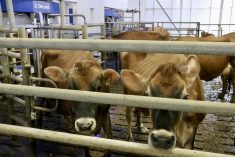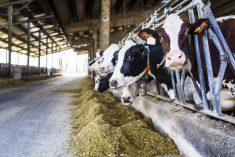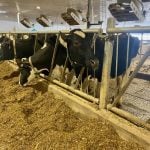Ottawa | Reuters –– Trailing in second place with two weeks left before Canada’s election, Conservative Prime Minister Stephen Harper announced a new trade deal Monday that largely protects the key agricultural voting bloc, putting pressure on opponents who had hoped to have more to attack.
Harper touted the Trans-Pacific Partnership as a good deal that offers only limited access to Canada’s politically important dairy, poultry and egg industries.
This largely neutralizes an anticipated attack from the opposition New Democratic Party, which had threatened to back out of a bad deal if they win office. The centre-left NDP’s last hope for political victory may have been voter anger over free trade.
Read Also

U.S. grains: Corn futures lower as farmers sell, soy choppy
Chicago corn futures ticked lower on Tuesday on selling pressure as soybeans chopped up and down, though expectations of a bumper U.S. harvest limited the upside in prices, analysts said.
The centrist Liberal Party, which has edged ahead of Harper in recent days, signaled it would probably support the deal.
“You are either in or out,” Harper told a news conference. “We choose to be in because there is simply too much to gain for Canada.”
A Nanos poll released Sunday suggested the race to the Oct. 19 election, which had been a virtual three-way tie for the first two months of the 11-week campaign, was increasingly between Harper and Liberal leader Justin Trudeau. The Liberals were winning 35 per cent support, with the Conservatives at 31 per cent and the NDP trailing at 24 per cent.
While farmers had said they could be crippled if Canada gave up too much of its supply management system that keeps domestic dairy and poultry prices high, Harper said the deal offered access to just 3.25 per cent of the dairy market and around two per cent of the poultry market over five years.
He also said Ottawa would offer a total of $4.3 billion over 15 years to compensate dairy and poultry farmers for losses they might suffer, a move aimed at shoring up support among voters in the Conservative’s rural heartland.
Still, voters in industrial Ontario, the province with the most seats up for grabs, could be angered by the expected hit to the auto industry.
“All the signs point to the TPP posing a major threat to good-paying jobs in Canada,” said Unifor National President, Jerry Dias, who represents autoworkers.
Harper said the Conservatives would soon announce measures to attract new auto investment and ensure the long-term sustainability of plants in the populous province.
— David Ljunggren is Reuters’ national political correspondent in Ottawa. Additional reporting for Reuters by Andrea Hopkins.
















